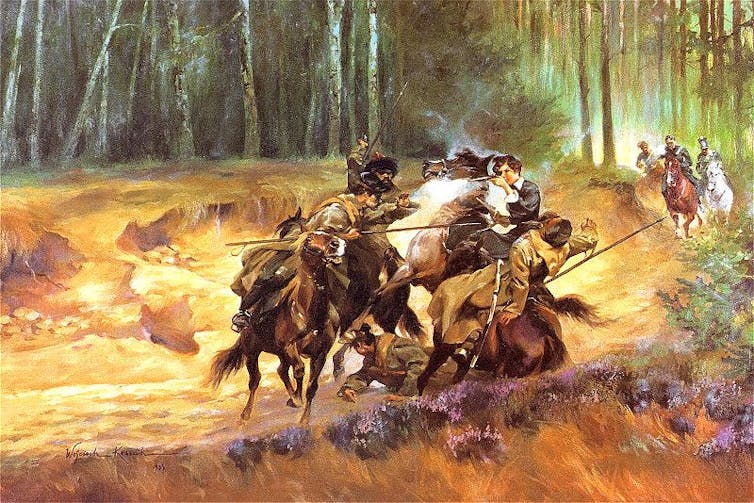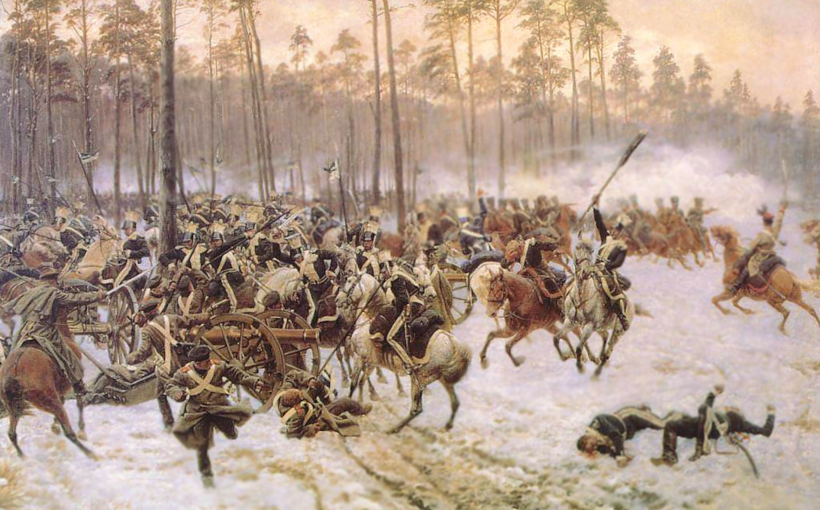
It has been reported that the US president, Joe Biden, has managed to scrape together US$300 million (£235 million) as an emergency measure to supply the Ukraine military with at least some ammunition as it struggles to hold the line against better-supplied Russian forces.
The news should stand as a reminder of just how urgent the situation is for Ukraine, which is begging its western allies to stand firm and maintain the levels of support that had given its army the edge over the invaders in the summer of 2022. After a few months of significant successes on the battlefield, growing shortages of weaponry stymied Ukraine’s long-awaited counteroffensive in the late spring of 2023. The conflict has developed into a war of attrition, giving Russia – which has a far larger population from which to recruit – the advantage if things don’t change soon.
There are valuable parallels to be had by considering the Polish uprising of 1830-1831. On November 19 1830, Polish insurgents rose to free their nation from the sovereignty of the autocratic Russian tsar, Nicholas I. This was not simply a nationalist uprising. As with the current war in Ukraine, ideological principles were at stake with implications for all of Europe.
The officer cadets who led the revolt had been outraged by the tsar’s suggestion that Polish troops might be used to suppress liberal revolutions in France and Belgium. Poland itself was partitioned between Russia, Austria and Prussia.
Russia’s share, the Congress Kingdom of Poland, was technically a constitutional monarchy, with a liberal constitution: the Napoleonic Code, a free press and an elected assembly (the Sejm).
Yet the tsar held supreme power – he could dissolve the Sejm, veto legislation and send Polish troops to crush foreign revolutions. Nicholas’s own contempt for constitutional government manifested itself in the growth of an oppressive police state. The Poles rose in defence of their liberties.
As with Ukraine in 2022, liberal sentiment across Europe quickly rallied to their cause and support for the Polish was widespread.
The military history of the war also offers instructive parallels with the current war in Ukraine. The tsar’s determination to crush the insurrection and impose his will on the Poles in 1830 is a reminder of how deeply-rooted Russia’s strategic goals in eastern Europe are.
It is, therefore, most unlikely that the current autocrat in the Kremlin – who has often lamented the loss of empire with the collapse of the Soviet Union in the early 1990s – will be sated with minor territorial gains in Ukraine. The resistance offered by the Poles, on the other hand, was redolent of the early successes won by Ukrainian arms in 2022.
David v Goliath
The odds seemed stacked heavily in Russia’s favour. A Polish army of 40,000 faced an invading Russian force of 120,000. Yet, as accounts by participants such as the Polish cavalryman Joseph Hordynski reveal, the skill and professionalism of Polish soldiers was enough to stall the Russian advance.
At battles such as Stoczek, (February 14 1831), Białołęka (February 24-25 1831) and Debe-Wielke (March 30 1831) the Poles either defeated the Russians or fought them to a standstill.
Hordynski describes effective use of combined arms tactics, skilful use of terrain, feigned retreats and ambushes. Russian forces seemed ponderous and uncoordinated in comparison, again echoing the battlefields of 2022.
In another parallel with the current conflict in Ukraine, widespread popular support fuelled Polish resistance. This extended even to areas outside Congress Poland, such as Lithuania, where Countess Emilia Plater led insurgent forces against the Russians. Then, as now, the Russians faced attacks in areas they had thought secure.

And yet the Polish uprising was crushed within a year. It is the circumstances of that defeat that perhaps demand the most scrutiny at this moment, as the war in Ukraine settles into a relentless attritional struggle, where Russia’s material advantages threaten to overwhelm Ukraine.
The Russian military performance improved in 1831, and they won an important victory at Ostrołęka, (May 16 1831). The resolve of Polish leadership wavered; General Józef Chłopicki and his successor General Jan Skrzynecki favoured reaching a negotiated settlement with the tsar.
While Polish battlefield tactics were bold, their national strategy was defensive and conciliatory. The uprising lost its impetus. By September 1831, the Russians had closed on Warsaw. The defending army withdrew, finally crossing into Prussia in defeat.
Waning support
The Ukrainian president, Volodymyr Zelensky, is showing no such inclination towards a negotiated peace that would, as in 1831, effectively equate to a Russian victory.
Yet there is another aspect of Poland’s defeat that suggests troubling parallels. The widespread popular sentiment in support of the uprising across Europe did not result in any meaningful material aid for the Polish cause. The preoccupations of domestic politics and narrow national self-interest combined to deny the Poles the means of sustaining their struggle.
The British were distracted by the debates over the reform bill. In Vienna, the Austro-Hungarian government was initially content to see Russia weakened but later, fearing the contagion of revolution, closed its border and handed over Polish refugees to the Russian authorities.
France’s government and new king, Louis-Philippe, presiding uneasily over a divided nation, settled on a policy of non-intervention. Prussia opted for pragmatism and opened its borders to Russian troops, allowed arms and provisions to cross its frontiers to alleviate Russian logistical weaknesses and arrested German volunteers travelling to join the Polish army.
Today, the wavering of international support for Ukraine echoes this situation. The Papacy calls for capitulation thinly veiled as negotiation, while in the US House of Representatives, Republicans block further aid to Ukraine. European nations are also struggling to deliver the munitions promised to Ukraine.
Ukraine cannot prevail without international support. Will its allies provide it – or will they abandon them, as they did the Poles in 1831?
![]()
Gervase Phillips does not work for, consult, own shares in or receive funding from any company or organisation that would benefit from this article, and has disclosed no relevant affiliations beyond their academic appointment.



